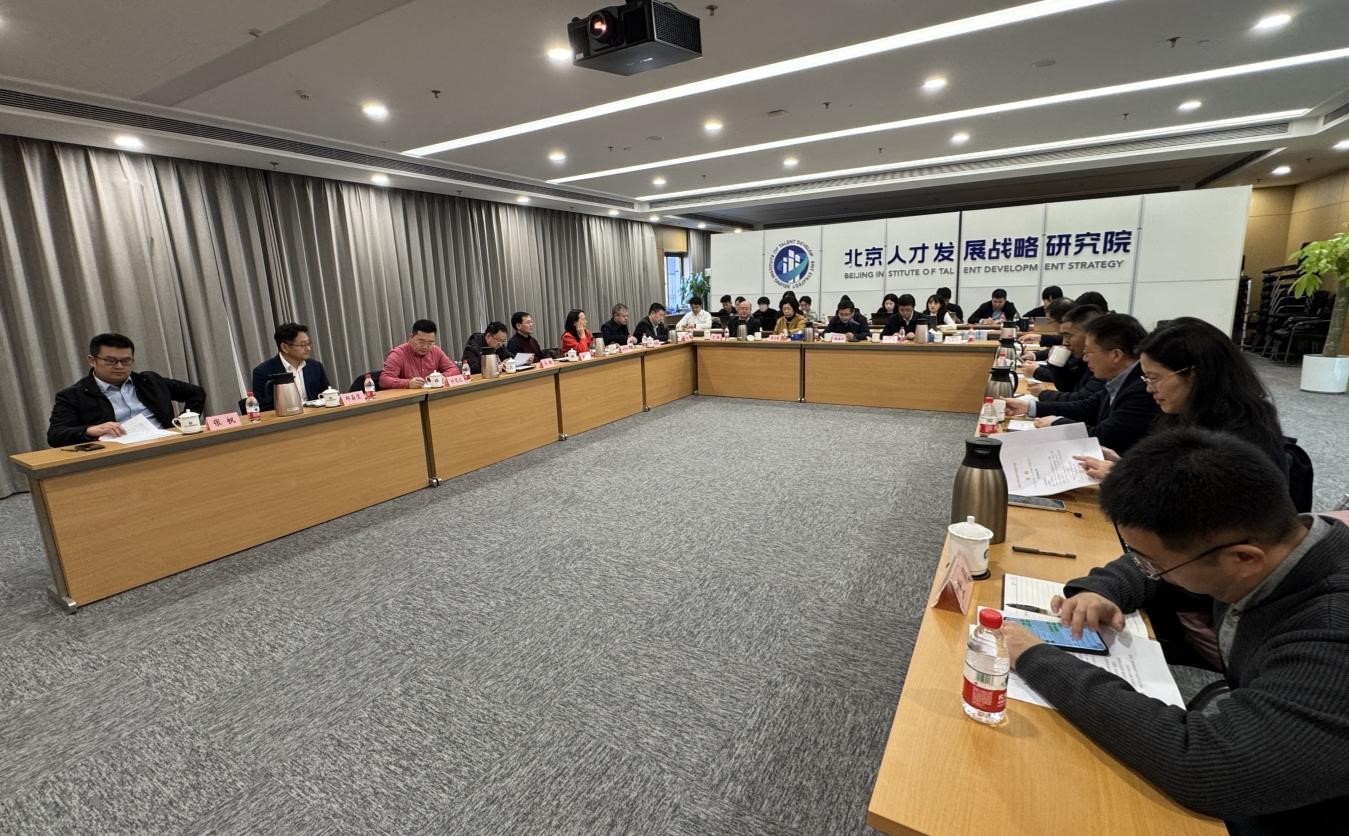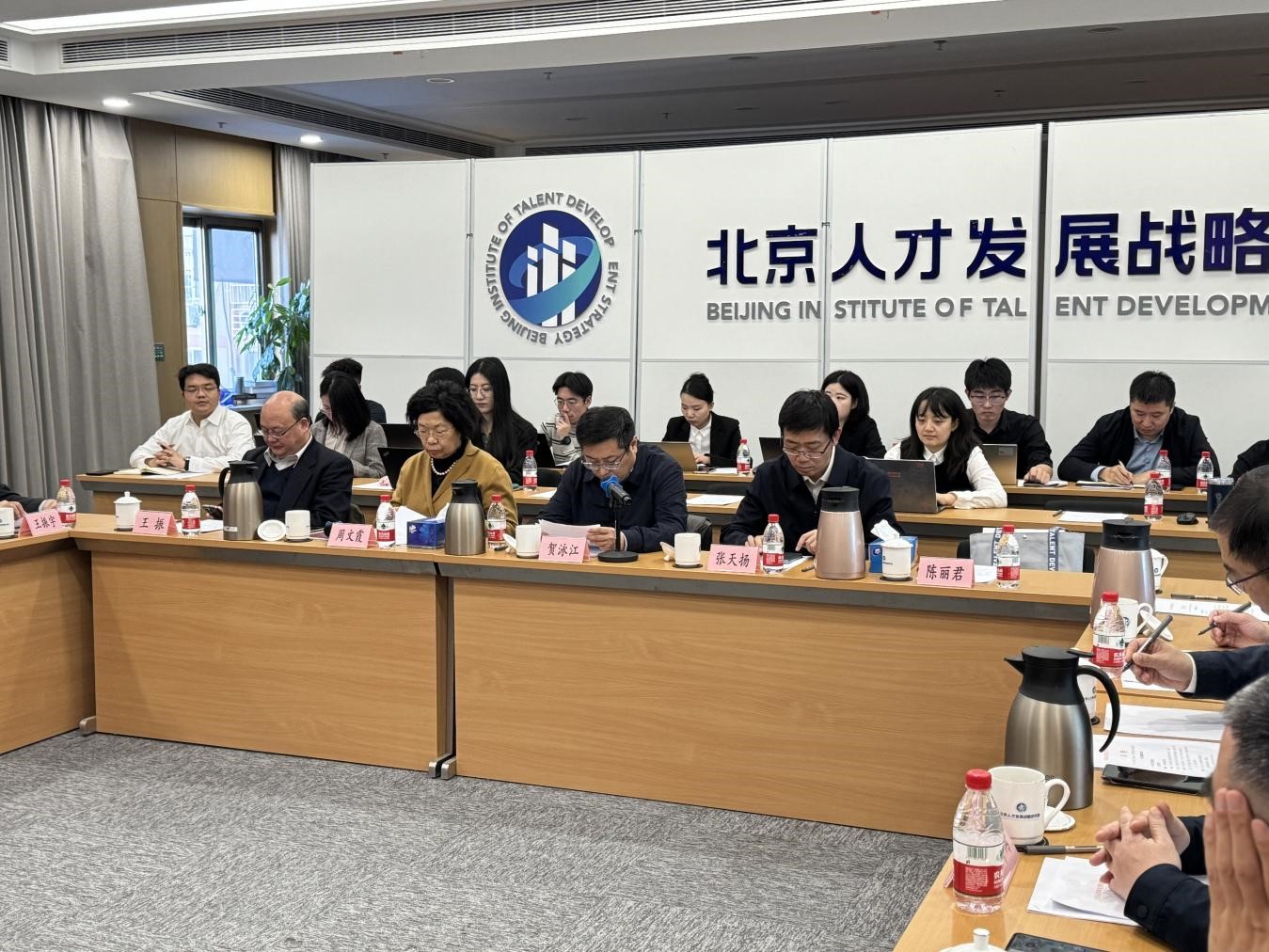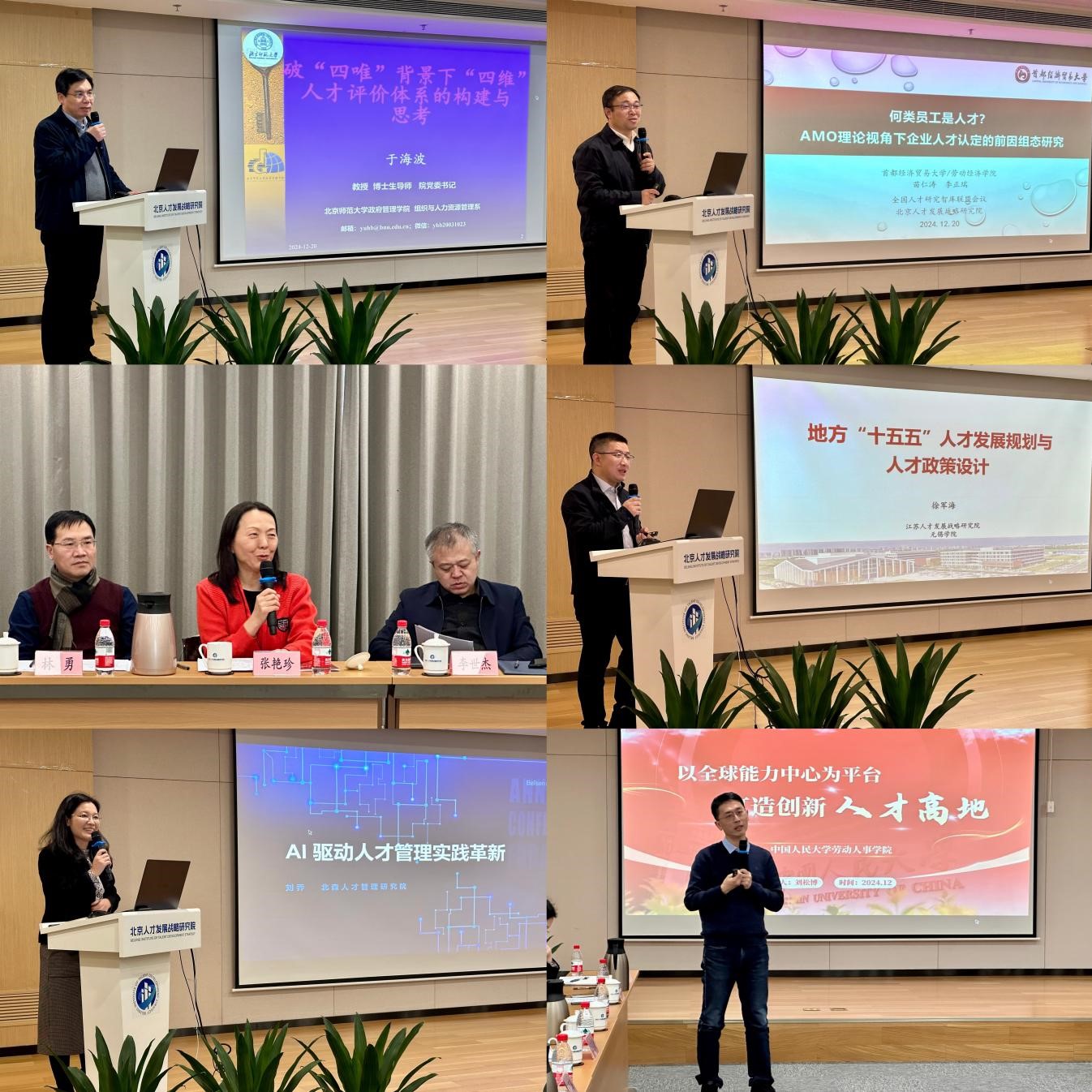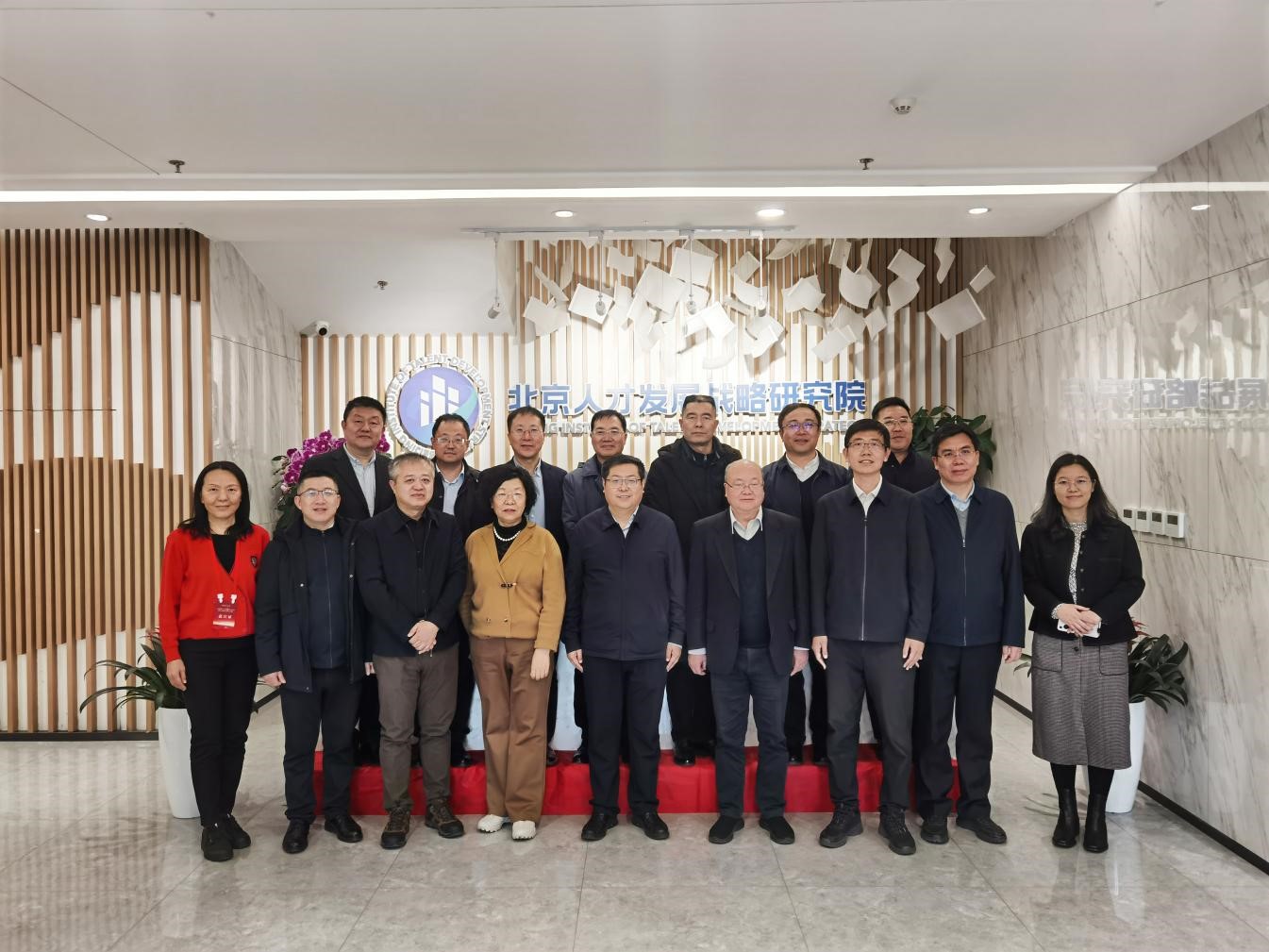The Chinese Research Institutes Alliance on Talent Conference Was Successfully Held
2024-12-26 17:27

To deeply implement the strategy of Developing Quality Workforce Strategy in the new era and to strengthen research in the field of talent, the Chinese Research Institutes Alliance on Talent Conference was successfully held on December 20th at the Beijing Institute of Talent Development Strategy. With the theme of "Talent Drives Innovation, Cooperation Leads Development," the conference invited over 20 guests from talent research institutions in Beijing, Shanghai, Guangdong, Jiangsu, Zhejiang, Hainan, and other places to attend and participate in discussions. The conference was hosted by Zhou Wenxia, a distinguished expert at the Beijing Institute of Talent Development Strategy and a professor at the School of Labor and Human Resources at Renmin University of China.

He Yongjiang, Deputy Director of the Beijing Talent Work Bureau, expressed his sincere gratitude to the experts and scholars who have long been concerned with and supported the development of Beijing's talent endeavors in his speech. He pointed out that the establishment of the Chinese Research Institutes Alliance on Talent is instrumental in aiding the reform of talent development systems and mechanisms, promoting the formation of a combined force in talent research, and playing a significant role in promoting the integration of industry, academia, and research, deepening talent exchanges, and serving regional coordination. He proposed that the alliance should fully leverage its platform and bridge role, benchmark against world-class think tanks, and through building a complementary and collaborative think tank ecosystem, jointly promote the high-quality development of talent research institutions, and more effectively serve the country's major strategic deployments and the overall economic and social development.

In the research results exchange session, experts and scholars conducted in-depth discussions on key and difficult issues in the field of talent.
Yu Haibo, Secretary of the Party Committee and Professor at the School of Government, Beijing Normal University, deeply analyzed the existing difficulties in talent evaluation under the theme of "Construction and Reflection of the 'Four-Dimensional' Talent Evaluation System under the Background of Breaking 'Four Solely'," proposing a "Four-Dimensional" talent evaluation system centered on "innovation ability, quality, effectiveness, and contribution," employing a multi-stakeholder, multi-strategy, and cyclical evaluation method, and establishing a spiral cycle mechanism of "pilot—summary—promotion."
Miao Rentao, Deputy Dean and Professor at the School of Labor Economics, Capital University of Economics and Business, sorted out the theoretical context of talent management and talent identification under the theme of "Which Employees Are Talents? A Configuration Research on Enterprise Talent Identification from the Perspective of AMO Theory," constructing an AMO talent identification theoretical model that includes opportunity, ability, and motivation, and deeply discussing the impact mechanism of collaborative linkage on talent identification.
Zhang Yanzhen, Deputy Director of the "Belt and Road" Special Committee of the Labor Economics Society, elaborated on the positive role of skilled talent in aiding new quality productivity and the development of countries along the "Belt and Road" from four aspects: policy environment, market demand, talent development paths, and suggestions for reflection, emphasizing the importance of work-integrated learning, apprenticeship education, and mutual recognition systems for skilled talent, and continuously fostering an ecological environment conducive to the development of skilled talent.
Xu Junhai, Deputy Director of the Jiangsu Institute of Talent Development Strategy, a member of the Party Committee and Deputy Dean of Wuxi University, pointed out the problem-solving ideas for difficulties in the talent field under the theme of "Local '15th Five-Year' Talent Development Planning and Talent Policy Design," emphasizing the importance of industrial scientific and technological talent for regional talent leadership, and further explaining the paths for attracting, cultivating, retaining, and using talent from aspects such as talent matrix structure, engineering projects, and allocation mechanisms.
Liu Qiao, a senior product expert at Beisen Talent Management Division, discussed the expansion and application of AI in talent management under the theme of "AI-Driven Innovation in Talent Management Practice," objectively evaluating the advantages of AI in talent assessment to aid corporate talent evaluation.
Liu Songbo, Deputy Dean and Professor at the School of Labor and Human Resources at Renmin University of China, introduced the concept, theory, and background of the Global Capability Center, and listed the current status, advantages, and challenges of multinational companies establishing Global Capability Centers in China under the theme of "Building a Highland of Innovative Talents with the Global Capability Center as the Platform." He suggested that China needs to continue to optimize the business environment, strengthen policy guidance and support, enhance the innovation capability and competitiveness of Global Capability Centers, to better integrate into the core links of the global industrial chain and enhance its discourse and influence in the global value chain.

In the think tank construction sharing session, Zhang Fan, Party Branch Secretary and Director of the Comprehensive Service Department of the Beijing Institute of Talent Development Strategy, Zhao Mingren, Executive Director of the Guangdong-Hong Kong-Macao Greater Bay Area Talent Development Strategy Research Institute at Shenzhen University, Chen Lijun, Director of the Zhejiang Institute of Talent Development Strategy, Director of the Administration Management Research Institute at Zhejiang University, and Professor at the Government Management Department of the School of Public Administration, Li Shijie, Director of the Hainan Free Trade Port Talent Development Research Institute, Deputy Director of the Economic Committee of the Hainan Provincial Political Consultative Conference, and Professor at Nankai University, Wang Zhen, former Deputy Director of the Shanghai Academy of Social Sciences, Executive Deputy Director of the Yangtze River Delta and Yangtze River Economic Belt Research Center, and Vice President of the Shanghai Talent Research Association, Wang Jianmin, Director of the Guizhou Talent Development Research Institute at Guizhou University of Finance and Economics, and Professor at the School of Public Administration, and other guests provided detailed introductions on the construction process, organizational structure, and research results of their respective talent research think tanks, fully discussing the necessity and difficult issues of building a talent research think tank alliance, based on the differentiated characteristics and diversified resources of each research institution, through mutual learning, mutual promotion, and mutual advancement, to build a deep dialogue platform for cross-field, cross-chain, and cross-regional cooperation.
The conference also discussed the "Articles of Association of the Chinese Research Institutes Alliance on Talent" and the proposed list of candidates for the presidium, expert committee, and secretariat of the first alliance conference.

The successful holding of the Chinese Research Institutes Alliance on Talent Conference has broken through geographical boundaries, strengthened the close connections between national talent research think tanks, and promoted in-depth exchanges and cooperation. By integrating wisdom resources in the field of talent, the conference has built an effective mechanism for jointly researching key issues such as talent cultivation, introduction, and motivation, injecting a strong intellectual impetus into the high-quality development of national talent research think tanks.

